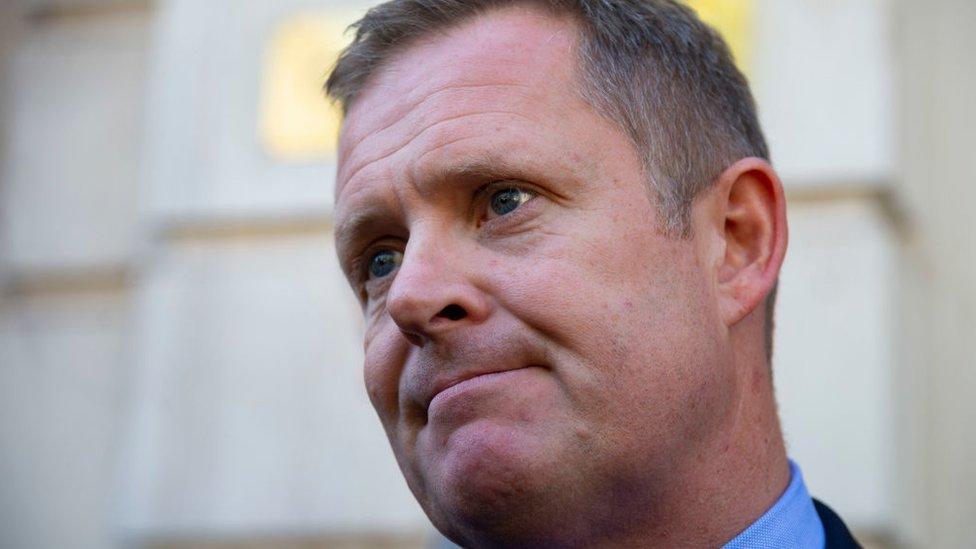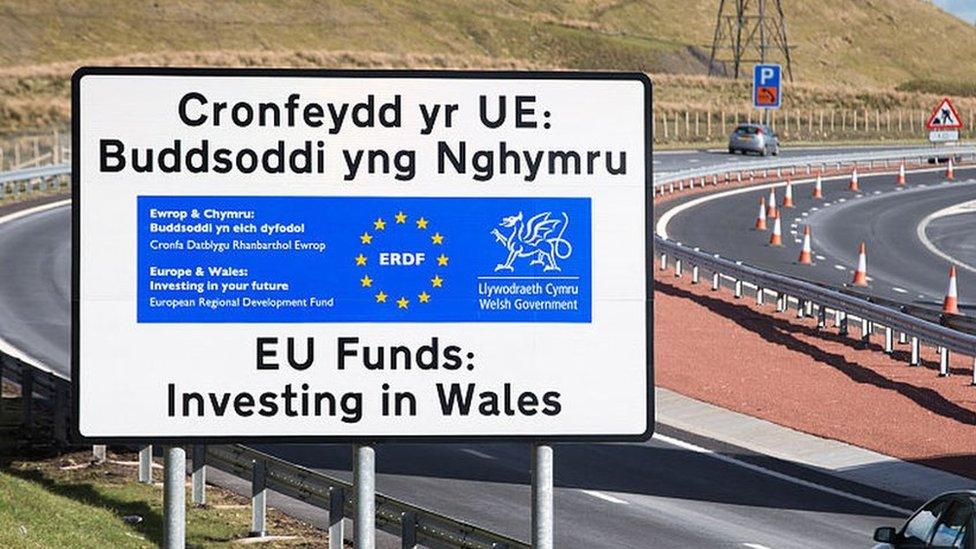Brexit: Councils in Wales 'to have stronger role' in replacement aid scheme
- Published
- comments

Plans for the UK government's shared prosperity fund are yet to be announced
Local councils will have a "stronger role" in the new fund to replace EU aid, the Welsh secretary has said.
Simon Hart said councils were "elected and accountable bodies that operate closest to the communities they serve".
Details of the fund are expected to be announced by UK ministers after the chancellor's spending review next week.
Welsh minister Jeremy Miles said there "appears to be a difference of opinion about the role the Welsh Government should play" in the new system.
Ministers in Cardiff insist they should control the fund, not UK ministers, but are also promising to give local authorities a bigger say.
Wales and Westminster have been arguing over who should ultimately control the purse strings of the Wales portion of the new shared prosperity fund (SPF).
EU funds in Wales have been administered by the Welsh European Funding Office, part of the Welsh Government.
Labour ministers in Wales have published their own proposals, external for how the new fund should be spent.
They said the UK government should set a "policy agenda", similar to the way the EU does.
But they argue it should then allocate funding "in full" to Cardiff, giving the Welsh Government "full autonomy over its SPF share on a multi-annual basis".
However, it seems both the UK and Welsh governments are agreed that local authorities should be much more involved in the process.
Welsh ministers say they "envisage a central role for local authorities".

Simon Hart said he saw a "stronger role" for local councils
Councils 'hungry to play greater role'
Writing in the Telegraph, external, Mr Hart said he saw "a stronger role for local councils, elected and accountable bodies that operate closest to the communities they serve".
"Of course - this is how the funding should have been operating all along, but the opposite has been the case," he writes.
Mr Hart said leaving the EU "gives us a once in a generation opportunity to click the restart button on how billions of pounds are spent across Wales".
"In the past week I've been meeting local authorities across Wales.
"They're all hungry to play a greater role in smarter investment of this funding - distributing it to those best able to target the money to projects that will benefit their communities most.
"I remain hopeful that the Welsh Government will take a collaborative approach, putting principles ahead of politics."
Legislation going through the UK Parliament would give Whitehall new powers to spend in devolved areas such as economic development.
Running for the Tory leadership in 2019, Boris Johnson said he wanted to see a "strong Conservative influence" over spending after Brexit.

Jeremy Miles says the UK government should be making "firm proposals" by now
What is the Welsh Government's take?
Responding to Mr Hart's article, and appearing before the Commons Welsh Affairs Committee on Thursday, Welsh minister for European Transition Jeremy Miles said "we are way beyond the stage at which its helpful for organisations in Wales to be reading things in the press".
"We really need to see some firm proposals" from UK ministers, he said.
"A set of proposals that reflect the devolution settlement would mean that funding comes to Welsh Government for Welsh Government to share, in accordance with the principles of our framework, and that framework has been developed with local government and has a very very strong regional character to it.
"You will have seen in it, perhaps, that a significant amount of decentralisation is envisaged from Cardiff Bay to regions right across Wales."
Mr Miles also denied "there's been any lack of collaboration on our part".
"I offered the UK government the services of our officials," he said.
"Those offers were not taken up."
- Published18 November 2020

- Published9 September 2020

- Published28 February 2020

- Published6 July 2019
